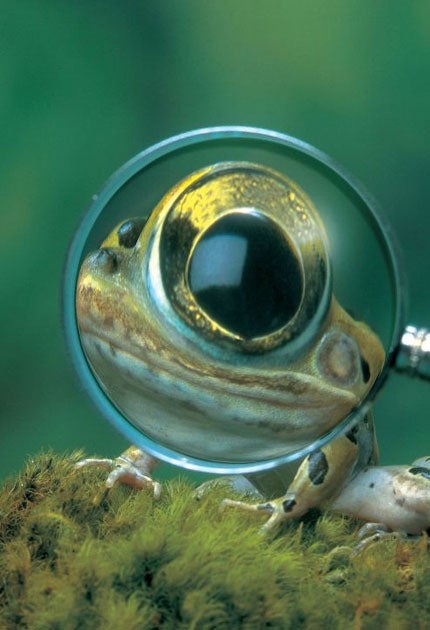Nature Club: Calling amateur naturalists
Britain has an extraordinary tradition of wildlife-watching – and our new Nature Club is a chance for readers to get up close with flora and fauna

Ever come across a purple emperor butterfly? Or a golden oriole? Or a bee orchid? If you have, you may well have experienced what is a common feeling on encountering some of our rarer and more spectacular wildlife species: the urge to tell people about it.
In extreme cases, this can involve grabbing the nearest passer-by and jabbering excitedly in their ear, but even for the most sober-minded souls, memorable wildlife encounters usually demand retelling. And today The Independent formally recognises the exhilaration and enthusiasm our wildlife can inspire, with the launch of a readers' forum devoted to special wildlife experiences, from month to month, throughout the year: Nature Club.
Seen baby barn owls learning to fly? A badger in broad daylight? A field full of poppies? A field full of field mice? A swallowtail butterfly where you wouldn't expect to see it? Tell us about it. If it's in any way distinctive or out of the ordinary, it's worth sharing, and you can share it with the huge community that is The Independent's readership.
Just as music-minded readers contribute their own reviews of concerts and bands in our Culture Club feature every Thursday, so readers interested in the natural world are now invited to send in their accounts of what nature has put in their path. At the start of each month, in our new Nature Club section on the Tuesday Environment pages, we will publish a selection of the best entries.
If you contribute, you're allying yourself to a formidable and ancient tradition – that of the British amateur naturalist. Although it's a tiresome cliché to repeat that Britain has the best of this and the best of that in the world, there is no doubt at all that Britain does possess the most extensive network of amateur wildlife observers anywhere on the planet, and that our flora and fauna are known better and in greater detail than anywhere else.
This was shown outstandingly five years ago in a seminal scientific paper which used the observations of thousands of British amateur observers, going back over many years, to back up the argument that the world is starting to undergo a Sixth Great Extinction (to follow the other five great extinctions in the geological record, the most recent being the asteroid collision of 65m years ago which is thought to have wiped out the dinosaurs).
The study by Jeremy Thomas (who is now the Professor of Ecology at Oxford) and colleagues, and published in the journal Science, was made possible because in Britain, uniquely, we have two sets of distribution atlases each for wild flowers, butterflies and birds. And comparison of the earlier and the later atlas, in each case, showed that nearly a third of native British plants had significantly decreased in 40 years, more than half of native birds had declined in just two decades, and in a similar period nearly three-quarters of British butterflies had fallen in numbers.
This was the first time it had been possible to compare accurately the rate of disappearance of insects against that of plants and birds, and it enormously strengthened the hypothesis that the world is entering a major phase of wildlife extinctions, which ultimately threaten the same impact as the catastrophic extinctions of millions of years ago (the worst being at the end of the Permian epoch, 250m years ago, when 95 per cent of species on earth are thought to have disappeared.)
The fieldwork for the atlases, which involved checking the presence of wild flower, bird and butterfly species in thousands of 10km squares across Britain, was done by an army of 20,000 volunteer amateur naturalists (and indeed, thousands more are currently at work on the third atlas of breeding birds, due for publication in 2013).
We tend to forget just how many people in Britain are seriously interested in the natural world. But we can get an indication from looking at the membership of the Royal Society for the Protection of Birds – 1,050,000, an astonishing figure, far more than all three main political parties combined – and then comparing it with the membership of its direct equivalent body in France, La Ligue Pour La Protection Des Oiseaux – which is 37,000, or 28 times fewer.
We know from our letters page, and the response we get to wildlife articles, that many Independent readers are amongst this enthusiastic company, and we are sure that Nature Club will open a fascinating new window on the natural world through your eyes.
As we will run the feature monthly, we ask you to bear seasonality in mind, and a sense of the changing year – in this month of July, for example, you can encounter the woodland butterflies of high summer such as the white admiral, the silver-washed fritillary, and that spectacular purple emperor; next month you will see swallows start to gather on telephone wires before their great migratory journey to southern Africa.
But we're interested in anything about British wildlife, if it's interesting in itself. Keep your entries short – a maximum of 100 words please – and send them to natureclub@independent.co.uk. We're looking forward to it.
To take part in The Independent's Nature Club, email your wildlife observations to natureclub@independent.co.uk; the best entries will be published each month
Join our commenting forum
Join thought-provoking conversations, follow other Independent readers and see their replies
Comments
Bookmark popover
Removed from bookmarks